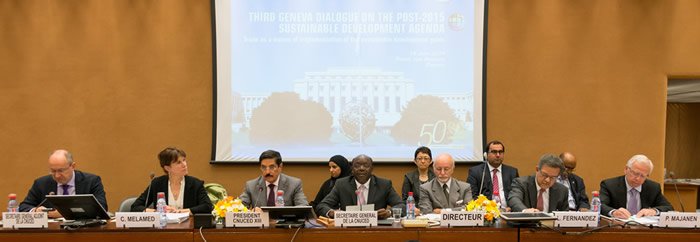Following on earlier Geneva Dialogues and in the context of fiftieth anniversary celebrations, UNCTAD Secretary-General Mukhisa Kituyi convenes the Third Geneva Dialogue at the Palais des Nations, Geneva on 18 June.
The Third Geneva Dialogue explored the role of trade as means of implementing the post-2015 sustainable development goals, which UNCTAD Secretary-General Mukhisa Kituyi noted in his opening remarks were currently being hotly debated by United Nations bodies charged with drafting the goals and targets that would replace the Millennium Development Goals next year.
Contributing to the dialogue were Mr. Hamad bin Abdulaziz Al-Kawari, Minister of Culture, Arts and Heritage of Qatar and President of UNCTAD XIII, Mr. Leonel Fernández Reyna, former President of the Dominican Republic, Mr. Pertti Majanen, Ambassador and Co-Chair of the Intergovernmental Committee of Experts on Sustainable Development Financing, and Ms. Claire Melamed, Head of the Growth, Poverty and Inequality Programme of the Overseas Development Institute, United Kingdom of Great Britain and Northern Ireland.
Dr. Kituyi said that the Millennium Development Goals had indicated "what" the main development goals to achieve were, while future sustainable development goals were expected to focus on "how" to achieve such goals, which would be universal. He noted that the zero draft on sustainable development goals prepared by the Open Working Group was placing greater emphasis on the economic dimension of sustainable development and included several references to the contribution of trade.
Mr. Al-Kawari said that the economic basis for the new development agenda should be well founded. The Millennium Development Goals had reaffirmed social justice, but they had somehow disregarded the importance of a sound economic base on which build employment and of having positive social spillovers. Mobilizing economic resources would represent a challenge to achieving social goals because sources such as development aid were decreasing. Since trade encouraged structural changes in societies, leading to further development, Mr. Al-Kawari said that the international community should consolidate the role of trade with regard to the eradication of poverty and boosting the role of women. Trade could also help measure economic and social factors which were important for sustainable development policy.
 Panel at the Third Geneva Dialogue (18 June, Geneva) |
Former President Fernández Reyna said that transforming trade into a means of implementing the development agenda beyond 2015 was an intensive task that required massive participation from Governments, civil society, private sector and academia. Decision-making in the international arena was of crucial importance in tackling issues such as food security, population dynamics, water, energy, gender, environmental protection and the rule of law - the essence of the post-2015 development agenda. Mr. Fernández further stressed that in order to become truly effective, these initiatives needed to be coordinated, working hand-in-hand. The technical expertise from human resources in institutions such as the World Trade Organization and UNCTAD should play a substantial and critical role.
Mr. Majanen said that the Intergovernmental Committee of Experts on Sustainable Development Financing meeting in New York was looking at new kinds of cooperation with the private sector to raise funds for sustainable development activities, in addition to traditional sources of financing. He acknowledged that trade had been a major integrator of the global community, serving as a learning tool for social and economic development. It should thus be considered as a means of implementation, and he urged the Geneva community to make contributions in this regard. He also pointed out that the available development financing could be used to operate risk-reduction strategies to allow investments in sustainable areas, and there the power of private finance could not be underestimated.
For her part, Ms. Melamed said that the future sustainable development goals should not be a long list of all that was desirable in development and the available policymaking tools to achieve them. Instead, the targets should be an opportunity to prioritize the collective aspirations that the world needed to solve. She said that global financial flows associated with trade (tax, revenues and so on) suffered from a lack of coordination and transparency. A trade agenda which would improve transparency and the coherence of trade, and tackle problems in the global tax system to improve the trading environment, would deliver benefits to people.
Some 250 participants - including member States, international organizations and representatives of civil society - actively intervened in the Dialogue and focused on the enabling climate and conditions under which trade could be used as an effective means of implementation in the context of the post-2015 development agenda. They also lauded UNCTAD in its efforts to connect the Geneva trade community with the post-2015 agenda-setting process at United Nations Headquarters and urged the organization to continue them.
In closing the Third Geneva Dialogue, Dr. Kituyi expressed appreciation to participants and indicated that UNCTAD would continue such discussions.


